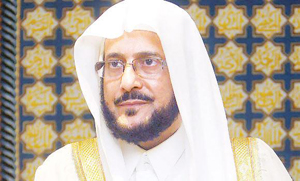
The period would be limited to just enough time for ablution and the actual time needed to complete a prayer, said Sheikh Abdullateef Al-Asheikh in the interview broadcast on an Arabic channel on Monday. “We would need the legislature to pass the proposed policy,” he said.
The Haia staff would do random inspections in malls to make sure people follow the new policy. He said Haia members would not chase people to pray.
“It is acceptable to perform prayers in a mall or shop in a group if the mosque is far away,” he said.
Shops across Saudi Arabia are required to close from the time of the call to prayer until the prayer is finished, which could take up to 30 minutes.
During the 35-minute TV program, Al-Asheikh toured a Riyadh shopping mall and interacted with shoppers and shopkeepers to get first-hand experience from people on the performance of his organization.
The chief said he would like his organization to do its job as envisaged by Custodian of the Two Holy Mosques King Abdullah “with moderate and tolerant views, and avoiding hurting the feelings of the public.”
Al-Asheikh took office two years ago with a mission to improve the image of the Haia and clear away decades of public distrust and contempt.
He has revamped the Haia's administrative and field operations to regain public trust. “It was an uphill task and resistance to change was expected,” he said.
Many of the old guard lost their privileges “as I stopped accepting donations to the Haia from private businesses,” he said.
Al-Asheikh said there were staff members who wanted the Haia to take an extremist view to serve their personal interests and ideological beliefs. “I will continue with the most moderate and tolerant view to lead this organization," he said.
He said he was not bothered by foreign media calling the organization the religious police.
“We look at a set of principles to follow within the teachings of Islamic Shariah. Let them call us whatever they want,” he said. The Haia has a mission to respect people, protect them, and keep women safe from harassment, he said.
The foreign media has tried to depict the Haia as a monster “but every country has rules and systems on which it operates. The Haia doesn’t block social movement as long as it doesn’t contradict our religion and culture,” he said.
Al-Asheikh said he upheld his promise to reform the organization. “I was once on an unannounced visit to a mall and found a Haia member not displaying his badge. I asked him to leave the mall immediately,” he said.
Shoppers in the mall asked him to employ more friendly Haia members. “We feel safe with them around us,” one woman shopper told Al-Asheikh.
During his tour of the mall, he stepped into an all-female shop, but to his surprise found a salesman. “We completely support women working in women-related shops, but in a case like this, we'll give them a chance to bring in a saleswoman,” he said.
In another women’s shop, he interacted with a saleswoman who said she appreciated the Haia’s mission and the professional treatment and respect of her shop-owner.
He reiterated that the Haia staff members are not allowed to check people’s cell phones unless they suspect of being involved in harassment, drinking alcohol or drug dealing.






Comments
Add new comment